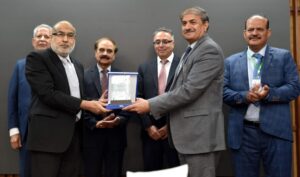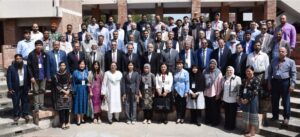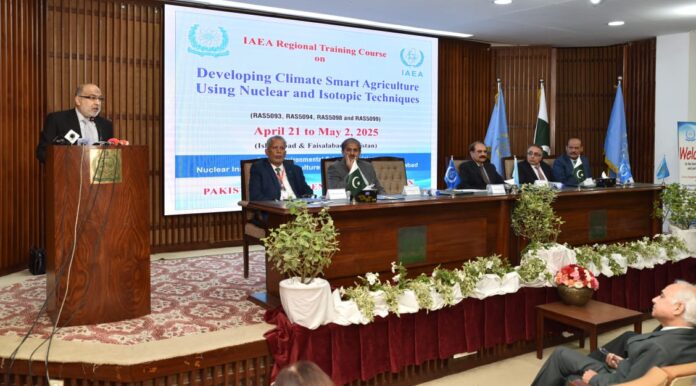- Advertisement -
ISLAMABAD, Apr 21 (APP): A 10-day regional training course on developing climate-smart agriculture using nuclear and isotopic techniques in Pakistan kicked off here at National Agriculture Research Council (NARC) on Monday.

The course is being arranged by the International Atomic Energy Agency (IAEA), in collaboration with the Pakistan Atomic Energy Commission (PAEC).
The Nuclear Institute for Agriculture and Biology (NIAB), Faisalabad being the premier agriculture research institute of the PAEC is the organiser of the training course.
Chairman PAEC, Dr. Raja Ali Raza Anwar was the chief guest on the occasion.
Speaking on the occasion, Dr. Ali Raza said, “I am delighted to be part of the Regional Training Course. As Chairman of the Commission, two subjects are very close to my heart: one is Nuclear Medicine and the other is Agriculture. I am happy to see a distinguished gathering of scientists from around the world attending this training course”.
He continued, “We often talk of climate change since we are among the most affected nations hit by this calamity. But if we don’t change our ways, our next generation will bear the brunt of it.”
Dr. Ali Raza further said, “Climate change is taking a heavy toll on our crops and their yields. If we fail to adopt modern techniques of agriculture like drip irrigation and don’t abolish conventional practices, research shows that our crop yields will go down 50% by 2050 in Pakistan.”
He added that seasons are changing and, owing to rising temperatures, we have recently witnessed the worst hailstorm in the capital, causing a lot of damage to vehicles and buildings. Growing trees can mitigate rising temperatures and reduce carbon emissions, he added.
“With support from the IAEA, we are engaged in several Technical Cooperation projects using nuclear techniques. This regional training course marks a milestone.”
He also mentioned the contribution of PAEC in the generation of nuclear power, which is endorsed by the IAEA as an effective solution to mitigating climate change.
He shared that, to date, PAEC’s six operational nuclear power plants have supplied 170 billion units to the national grid. Although the total installed capacity of these NPPs is just 7.7%, they have contributed as much as 25% of the total electricity produced by all sources in the energy mix during winters.
Dr. Mohammad Zaman, Section Head on Soil, Water Management and Crop Nutrition Program at the IAEA, Vienna, presented alarming figures, stated that countries would need an 80% to 100% increase in crop production in the wake of climate change. The reason for holding this training in Pakistan is that Pakistan is a success story in the fight against salinity, as it has tackled the issue of saline lands very well.
Dr. Zaman further said, “Unprecedented rise in temperature and water scarcity is the challenge being faced by all countries of the world. Contamination by microplastics, which research shows has penetrated our DNA, is another key issue. All such burning issues and their mitigation are part of the regional training course.”
Earlier, Dr. M. Yussouf Saleem, Director NIAB, welcomed the guests and shared with the audience that 45 participants from 21 countries, including Pakistan, will be trained during the 10-day training course. Of them, 36 are foreigners and 9 are from Pakistan whereas two Experts of IAEA have also arrived to deliver lectures.
On this occasion, the Guest of Honour, Dr. Ghulam Muhammad Ali, Chairman of the Pakistan Agriculture Research Council (PARC), in his address highlighted the performance of PARC and the National Agriculture Research Council (NARC).

At the end, Dr. M. Akhtar, DCS NIAB and Director of the training course, presented the introduction of the activity, which will continue in the capital for a week and then shift to NIAB, Faisalabad, where it will be concluded on May 02.

